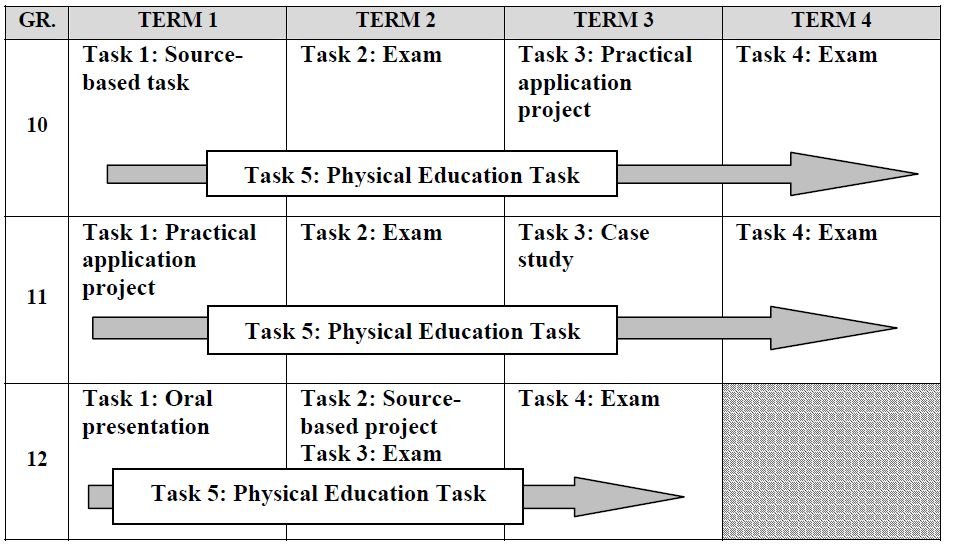Life Orientation Grade 12 Assessment Written Tasks for all terms CAPS for 2020, Life Orientation Grade 12 Assessment Written Tasks for all terms for CAPS Curriculum (Syllabus) South Africa: On this page you will find Life Orientation Grade 12 Assessment Tasks for all terms for Term 1, Term 2, Term 3, and Term 4. The tasks are for the year 2020
The only topic not subject to external assessment or examination in the National Curriculum Statement is Life Orientation. However, a student will not be promoted or given a National Senior Certificate (NSC) unless they can show tangible proof that they performed well on the required assessment tasks for that grade and that they met the minimal standards for promotion or certification for the NSC. A learner will receive an incomplete grade for the subject if they fail to provide proof of their completion on any of the five formal assessment tasks required for Life Orientation each grade, unless a good reason is provided in their collection of proof.
Life Orientation is the only subject in the National Curriculum Statement that is not externally assessed or examined. However, a learner will not be promoted or issued a National Senior Certificate (NSC) without providing concrete evidence of performance in the stipulated assessment tasks for that particular grade and meeting the minimum promotion or certification requirements for the NSC. A learner who fails to submit evidence of performance in any of the five formal assessment tasks expected for Life Orientation per grade will receive an incomplete result for the subject, except in cases where a valid reason is included in the learner’s collection of evidence.
When assessing the knowledge, skills and values of learners, the four Learning Outcomes of Life Orientation can feature independently or in an integrated manner, but all four Learning Outcomes should be assessed in each grade.
Available Assessment Tasks for all terms Life Orientation Grade 12
Daily Assessments: Daily assessment in Life Orientation provides learners with a variety of opportunities to develop and master the knowledge, skills and values related to the subject. In Life Orientation, the teacher may choose to use a short class test, request learners to practically demonstrate a skill or engage learners in a short mind map exercise as a daily assessment task. For example:
- Learning Outcome 1- record consequences of a decision on a mind map.
- Learning Outcome 2- answer questions to a quiz on social and environmental issues.
- Learning Outcome 3- demonstrate a ball-handling technique required in a game.
- Learning Outcome 4- role-play activities found in the workplace.
Example of an annual assessment plan for Life Orientation in Grade 12

Physical Education Task (Example)
The Physical Education Task (PET) constitutes the fifth task and is administered across all four school terms. Learner participation and performance in the PET is, therefore, to be assessed and reported in each term. The marks obtained per learner per term are added up to give a total mark out of 100 for the PET at the end of each grade. The mark allocation for the PET (Task 5) is 25% of the total mark out of 400 for Life Orientation, i.e. 100 marks.
The Physical Education Task focuses solely on the Physical Education component (Learning Outcome 3) which comprises three different movement sections:
- Fitness;
- Games and Sport;
- Recreation.
Learners are expected to participate in a Physical Education period once a week, which is timetabled to take place in a fixed period labeled Physical Education on the school timetable. The activities that the learners engage in should cover the physical activities relevant to the three-movement sections. In the main, the activities presented in a period should be practical in nature where learners engage in and perform movement activities.
Types of Grade 12 Life Orientation Tasks and Assessments
There are many different forms of assessment tasks. These include:
- Tests
- Investigations
- Assignments
- Case Studies
- Demonstrations
- Design and Make
- Presentations
- Debates
- Interviews
- Role-Plays
- Projects,
- Simulations,
- Written reports,
- Exhibitions
- Research
